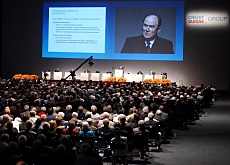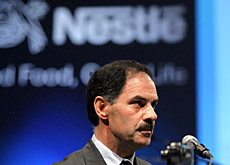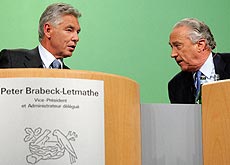Shareholder activists turn on “model pupil”

After scoring a "moral victory" for shareholder rights at food giant Nestlé, pension fund representative Ethos is turning its sights on banking giant Credit Suisse.
The latest development is not without irony – a recent report by Ethos on corporate governance put Credit Suisse (and rival UBS) among Switzerland’s three “star pupils”.
Four Credit Suisse board members were standing for re-election for further three-year terms at the bank’s annual shareholders’ meeting on Friday, including Nestlé CEO (and now also chairman) Peter Brabeck.
Ethos, which spearheaded a significant shareholder revolt – 36 per cent – against Brabeck’s “double mandate” at Nestlé earlier this month, had been leading a fight against his re-appointment to the Credit Suisse board.
But attempts to unseat him came to nothing after Brabeck was re-elected by an overwhelming majority of 90.9 per cent.
Ethos, which represents 83 Swiss pension funds, had argued that three of those seeking a renewed mandate were sitting on too many boards.
Brabeck, in addition to his dual role at what is Switzerland’s largest company and his board position at Credit Suisse, is also on the boards of pharma multinational Roche, Nestlé subsidiary Alcon and cosmetics giant L’Oreal.
Another Credit Suisse board member, Ernst Tanner, is both chairman and CEO of renowned chocolate manufacturer Lindt & Spruengli, and also sits on the board of watch industry market leader, Swatch.
And Ethos says one of the other two nominees, Thomas Bechtler, is on the board of no fewer than 30 companies, in addition to his main job as CEO of a family-run business.
Questionable
Analysts had made it clear that there was little chance of Ethos and its supporters winning the vote at the shareholders’ meeting.
However, they point out that – as at Nestlé – the real aim was to intensify the public debate about corporate governance and shareholder rights.
Some experts say the debate also raises fundamental ethical issues – not to mention more practical questions.
“We are told that these mandates are so highly rewarded precisely because of the extremely high demands they make on the incumbents,” Ulrich Thielemann, deputy director of the institute for business ethics at St Gallen university, told swissinfo. “If that is so, how do they actually find the time for all of them?
“Then you have to ask the question: why is this being done? What actually motivates them? Are there possibly other reasons that we are not aware of, but which are not directly related to management challenges?”
British example
Ethos director Dominique Biedermann says that while there are no internationally accepted standards in this area, Britain in particular has clear restrictions on the number of mandates that any corporate leader can occupy simultaneously.
The British model is held up by many observers as the best example of how corporate governance procedures should look in a major industrialised economy.
Following a raft of reforms, beginning in the early 1990s, British laws not only limit the activities of top executives, but also insist on complete transparency regarding executive compensation.
They even give shareholders the annual right to vote on the issue – although the company is not bound to accept their verdict.
This practice created headlines in 2003 when shareholders revolted against the “golden parachute” offered to Jean-Pierre Garnier, CEO of pharma giant GlaxoSmithKline, as part of his employment package. This was described at the time by the respected Economist newspaper as a “reward for failure”.
Swiss reforms
Such requirements are still a long way off in Switzerland, although observers point out that significant reforms have been introduced in recent years, in the wake of corporate scandals in the United States and domestic shocks including the unexpected collapse of former national airline Swissair.
However, as in the US, the majority of corporate governance reforms have been at the level of accounting and auditing procedures.
While more information must now also be published about top executive compensation, full transparency is still not a requirement – and it is up to individual companies to decide how many positions their top people can or should occupy simultaneously.
As for Credit Suisse, it says all board members discharged their obligations as required last year, participating in all – or nearly all – board and board committee meetings.
Board members at the Swiss bank meet six times a year, for full-day meetings that require considerable preparatory work.
In addition, the board has four permanent committees, each of which convenes several times a year for (shorter) meetings – the chairman’s and governance committee, and the audit, compensation and risk committees.
Board chairman Walter Kielholz confirmed on Friday that Brabeck had decided to relinquish his position as deputy chairman of the board and as a member of the compensation committee.
swissinfo, Chris Lewis in Zurich
The principles of corporate governance embrace two main areas.
On the one hand, they should establish a balance of power within a company, for instance by separating the roles of executive management and the board of directors (management oversight).
On the other hand, they should protect the rights of shareholders over both board and management.
Credit Suisse shareholders have voted in favour of renewing Peter Brabeck’s mandate to serve on the bank’s board.
Ethos opposed three nominees, including Brabeck, on the grounds that they have too many simultaneous mandates.
The latest battle comes after Ethos spearheaded a significant shareholder revolt against Brabeck’s “double mandate” at Nestlé.

In compliance with the JTI standards
More: SWI swissinfo.ch certified by the Journalism Trust Initiative


You can find an overview of ongoing debates with our journalists here . Please join us!
If you want to start a conversation about a topic raised in this article or want to report factual errors, email us at english@swissinfo.ch.